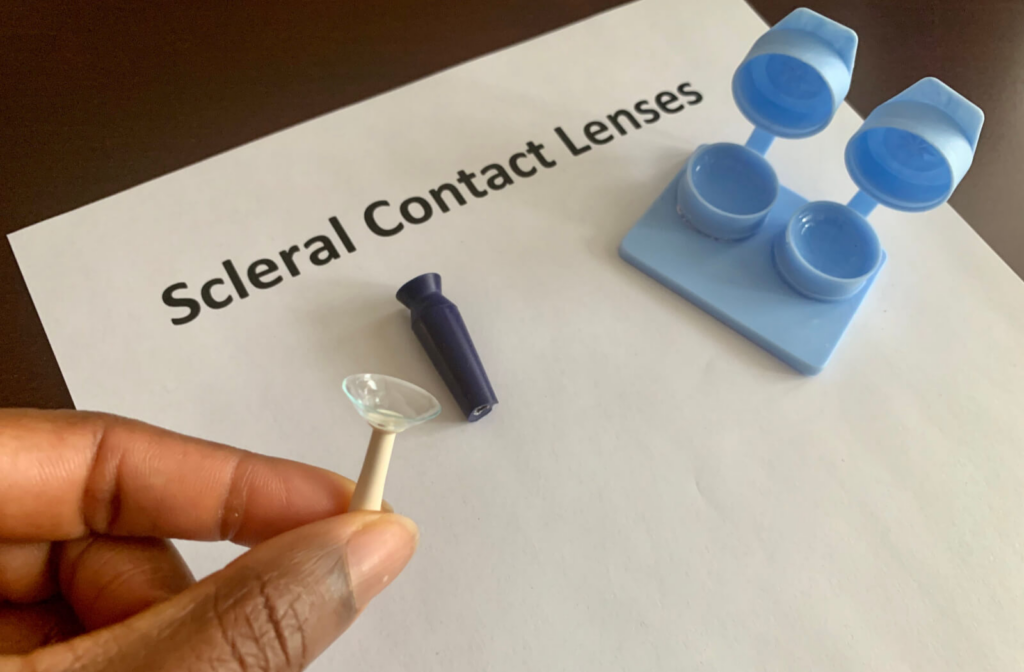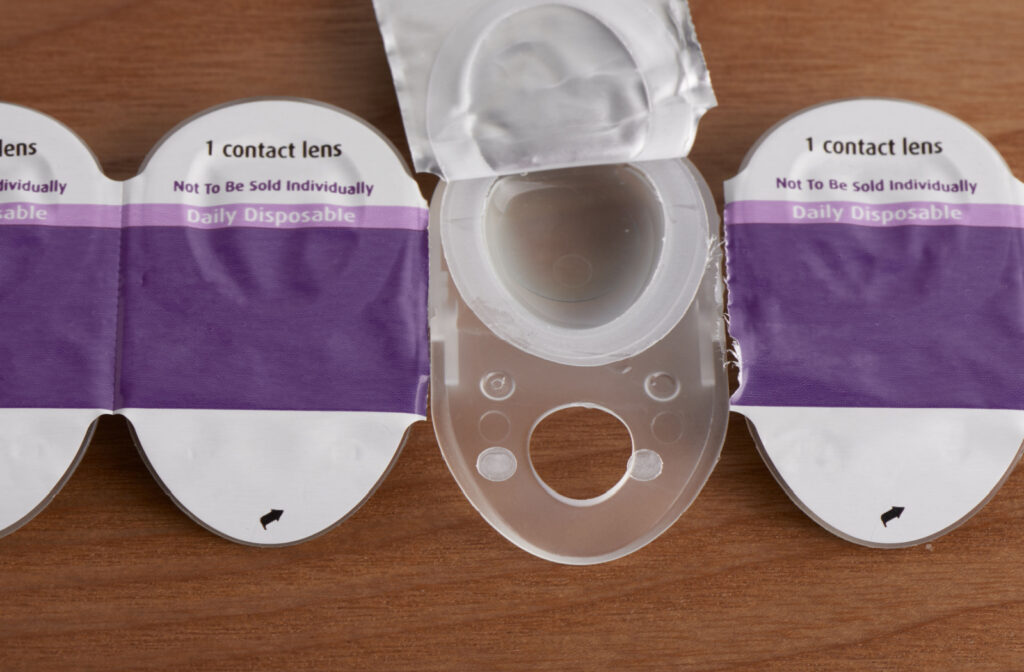Dealing with dry eye syndrome can be frustrating and uncomfortable. The gritty, burning, irritating feeling can impact your day-to-day life and make wearing contacts difficult, but fortunately, there are options available for dry eye therapy. One of these options is the use of specialty contact lenses.
When it comes to dealing with dry eye syndrome, there are a few types of contact lenses that can help. These include:
- Scleral lenses
- Hybrid lenses
- Daily disposable lenses
- Silicone hydrogel lenses
Before choosing which lens to use to treat your dry eye syndrome, it’s important to consult your optometrist during your next comprehensive eye exam. Each of these lenses works differently, and it’s essential to follow your optometrist’s recommendations when it comes to care and hygiene. Properly taking care of your eyes and lenses can help alleviate dry eyes!
What Is Dry Eye Syndrome?
Dry eye syndrome, also known as dry eye, is a common condition that affects millions of Americans every year. It often feels like a dry, sandy, or burning sensation on your eyes, leading to irritation and redness. There are several causes of dry eyes, but one of the most common is an issue with your tear production.
Your eyes are covered with a thin film of tears that gets refreshed and re-spread evenly every time you blink. These tears are made up of 3 layers:
- The water layer, which hydrates and lubricates the eye.
- The oil layer, which helps stop your tears from evaporating too quickly.
- The mucin layer, which helps keep your tears on the surface of your eye and ensure they spread evenly.
When there is an issue with one or more of these layers, or your eye simply doesn’t produce enough tears, it can lead to dry eye syndrome. However, this isn’t the only cause. Dry eye can also develop as a result of digital eye strain—or if you spend a lot of time in an environment that’s dusty, dry, or humid.
Fortunately, there are solutions available for dry eye syndrome. Through the use of specialty contact lenses, eye drops, or changing up your environment, you can take steps to alleviate your dry eyes.

Can You Treat Dry Eye with Contacts?
Contact lenses can be an effective way to help with dry eye syndrome if they’re utilized and cared for properly. It’s always best to speak with your optometrist during a contact lens exam so they can help you build a routine that ensures the best hygiene for your eyes.
When it comes to specialty contact lenses, there are several options available, including;
- Silicone hydrogel lenses: These are soft lenses made from a mix of silicone and hydrogel and are designed to allow more oxygen through to reach the surface of your eye. By making the lens more permeable and including a higher water content, they can help keep your eyes hydrated and moisturized.
- Scleral lenses: These lenses are slightly larger in diameter than standard contacts. Rather than sitting on the surface of your cornea, these lenses sit on the whites of your eyes and arch over the cornea. This creates a gap where moisture can collect and prevent dryness.
- Hybrid lenses: These combine two materials: a rigid, gas-permeable center and a soft outside ring. The harder center is designed to help correct refractive errors, and the soft outer ring is designed to help make the lens more comfortable.
- Daily disposable lenses: One of the common causes of dry eye syndrome is a lack of proper hygiene, leading to dirt and bacteria eventually spreading to the eyelid and blocking glands. By using daily disposable lenses, this risk of buildup can be significantly reduced.
When it comes to contact lenses, hygiene is extremely important. You should always wash your hands with soap and water before and after handling your contact lenses, and ensure your contact solution has not passed its expiration date. Focusing on proper care and hygiene can help reduce the risk of discomfort and irritation from dry eyes.
What Is the Best Way to Treat Dry Eyes?
Specialty contacts, while an excellent option, aren’t the only option available to help with dry eye syndrome. You can also:
- Use artificial tears or eye drops. These can help reduce irritation while helping keep your eyes moisturized and hydrated.
- Take breaks during extended screen usage to avoid eye strain.
- Protect your eyes by avoiding dry and dusty environments and wearing protective eyewear.
- Maintain proper hygiene and cleanliness for your eyes by cleaning your contacts and hands properly.
Overall, there are many ways to help treat dry eyes. However, one of the most important things you can do is visit us for a comprehensive eye exam. When you speak with our educated and caring eye care team, we can help determine what’s causing your dry eye syndrome and provide treatment that can provide relief.
To learn more about the best contact lenses for dry eyes and your dry eye therapy options, contact our team at Optical Illusions!



